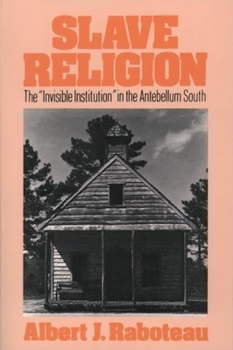Slave Religion: The Invisible Institution in the Antebellum South
Select Format
Select Condition 
Book Overview
An account of the religious life of antebellum slaves traces origins, conversions, popular forms and practices, and the unique melding of Christianity, the realities of slavery, and the African heritage.
Format:Paperback
Language:English
ISBN:0195027051
ISBN13:9780195027051
Release Date:February 1980
Publisher:Oxford University Press, USA
Length:400 Pages
Weight:0.78 lbs.
Dimensions:0.9" x 7.9" x 5.3"
Customer Reviews
3 ratings
excellent and informative
Published by Thriftbooks.com User , 19 years ago
Prof Raboteau's book is clearly written and highly informative. He has an excellent sense of how to present his material in an engaging manner, and a sharp critical faculty. I enjoyed reading this book very much - as I also enjoyed his more recent books, A FIRE IN THE BONES and A SORROWFUL JOY, both of which I would recommned.
Recovering lost voices...
Published by Thriftbooks.com User , 20 years ago
Albert J. Raboteau originally wrote 'Slave Religion: The "Invisible Institution" in the Antebellum South' as an expansion and derivation of his doctoral dissertation, little expecting it to become a classic. This updated version, twenty-five years after its original publication in 1978, includes Raboteau's response to some of the reactions he received over time from various audiences. Citing his friend and mentor Sydney Ahlstrom's prediction, the recovery of African-American history as a subject in its own right also served to revitalise the subject of American religious history, as African-American history cannot be told without a great part of the religious traditions, and the religious history of America cannot be told adequately without incorporation of the African-American experience. Raboteau writes in terms of recovering voices, particularly for this study, the voices of slaves preserved in narratives from the past. This idea of recovering voices is a strong theme in liberation theologies, and applies in important ways both to secular and religious history (as well as present-day practice). Not only the voices, but also the actual events need to be recovered - as Raboteau points out, before the 1820s, far more Africans made the trans-Atlantic journey to the Americas unwillingly than Europeans of all nationalities and religions. The idea of European development of the New World obscures this important fact. But just what was slave culture? Was this something distinct and unique? Were there multiple slave cultures? Raboteau, speaking in context of the religious, could not ignore the political, and argued that there were vital and creative means of continuation of African cultural influences, often overlaid with Christian and European influences, that provided what he calls a pre-political solidarity that, while not always directly challenging the institution of slavery, provided the kind of foundation needed for questioning of authority needed to break the mindset of the institution of slavery. Raboteau claims that his primary intention in writing this text was the passing-on of unwritten traditions, oral traditions no longer heard; this goes hand-in-hand with the desire through historical methodology to increase wisdom along with the spiritual task of reflecting upon a tradition that stands a continuing challenge to the complacency exhibited by most of Christianity (not to mention individual Christians). With regard to the task of preserving oral traditions, Raboteau's text is very good. He incorporates hymns and songs, poems and stories, historical accounts and academic analyses of various sources for the preservation of this important history. Raboteau includes pieces from original African languages as well as adaptations by those Africans already in the Americas. He describes in good detail various practices, such as the ring shout, as well as belief structures. For example, the preservation of elements of African g
Experiencing The Experiences Of Enslavement
Published by Thriftbooks.com User , 24 years ago
Slave Religion is a valuable text. The author does an excellent presentation of the experiences of our ancestors prior to their departure from Africa and their arrival on the plantations. I use this text in a course I teach, The History of the Black Church. The author is to be commended for his research.







